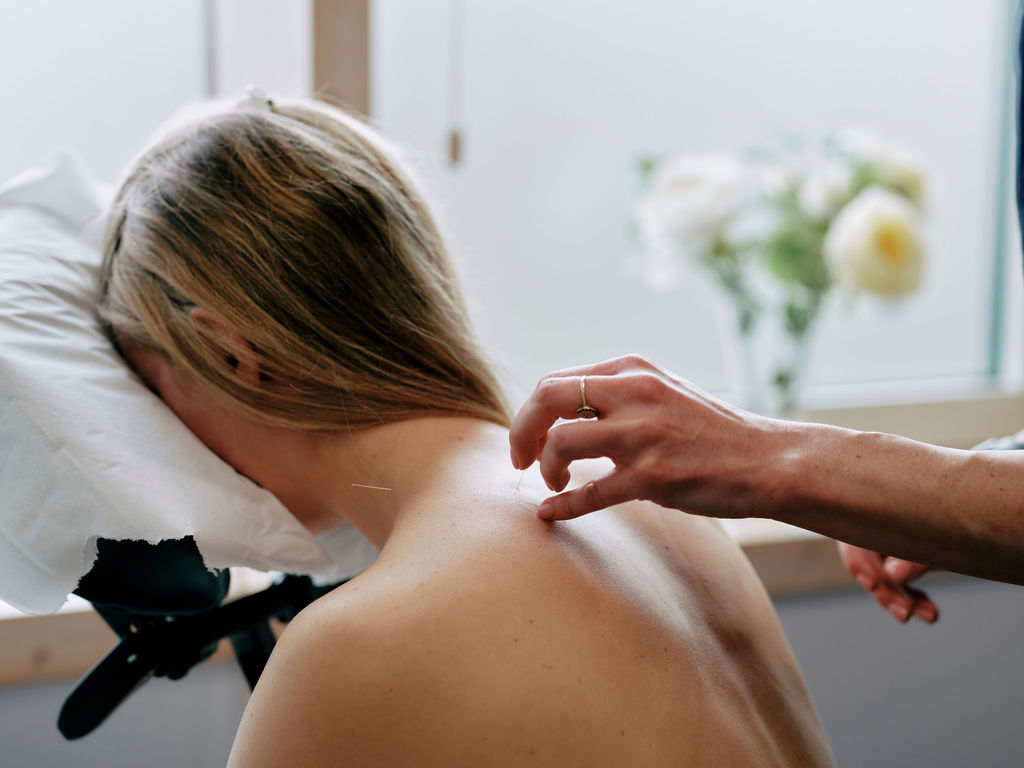Stress-Related & Lifestyle Pain
Modern life places a huge amount of strain on both body and mind. Stress, long hours at a desk, and poor posture can all lead to persistent aches, tension, and discomfort. At Health Point Clinic, we support patients by combining acupuncture and massage to relieve stress-related pain, ease muscular tightness, and restore balance.
Stress-Related Tension
Stress often shows up physically in the body, commonly in the neck, shoulders, and jaw. Acupuncture calms the nervous system and reduces stress responses, while massage provides immediate relief for tight, tense muscles.
Office & Desk Related Pain
Spending long hours at a desk can lead to backache, wrist pain, and postural strain. Regular treatment can help correct these imbalances, improve circulation, and prevent niggles from developing into more serious injuries.
General Muscle Tension & Fatigue
Whether from physical overuse, emotional stress, or poor sleep, muscle fatigue and tension can make you feel heavy and drained. Our holistic treatments help relax tired muscles, improve recovery, and boost energy.
Acupuncture Research
Acupuncture is included in the NICE guidelines for Chronic pain (primary and secondary) in over 16s: assessment of all chronic pain and management of chronic primary pain (CG193) and headaches: diagnosis and management (CG150)
In recent years high-quality clinical trials investigating acupuncture have been conducted, particularly for chronic pain conditions. Therefore, there is evidence available, and the systematic reviews can draw firm conclusions. A systematic review of high-quality trials, Vickers et al 2018, involving over 20,000 adults with osteoarthritis, chronic headache or musculoskeletal pain (back, neck or shoulder) concluded:
- acupuncture was more effective than control for all pain conditions (pragmatic trials)
- acupuncture is not a placebo for treatment of chronic pain
- the effects persisted over time (15% reduction at one year)
Booking Tip: If your pain is related to work or stress, we recommend scheduling treatments at regular intervals, such as every 2–4 weeks depending upon your pain levels, to keep tension from building up and to maintain both comfort and productivity.
Further Acupuncture Research:
- Ease anxiety, depression & stress-related tension (1)
- Improve sleep quality in insomnia & PTSD (2)
- Reduce pain linked to stress & lifestyle (3)
- Safe, non-drug support for mental health (4)

- Amorim, D., Amado, J., Brito, I., Fiuza, S. M., Amorim, N., Costeira, C., & Machado, J. (2018). Acupuncture and electroacupuncture for anxiety disorders: A systematic review of the clinical research. Complementary Therapies in Clinical Practice, 31, 31–37.
- Allen, J., et al., Use of Acupuncture for Adult Health Conditions, 2013 to 2021: A Systematic Review. JAMA Network Open, 2022. 5(11): p. e2243665-e2243665.
- Huang W, et al. J Clin Psychiatry 2018; 80 (1); King HC, et al. Mil Med 2015; 180: 582-90.; King CH, et al. J Holist Nurs 2015; 34: 291-9.
- Metcalf O, et al. J Trauma Stress 2016; 29: 88-92.; Feng B, et al. Psychiatry Clin Neurosci 2019; 73: 179-86. Lee, M. S., & Ernst, E. (2011). Acupuncture for psychological conditions: An overview of systematic reviews. The International Journal of Clinical Practice, 65(9), 991–1000. Pilkington, K. (2018). Acupuncture for anxiety: a systematic review of the clinical research. Autonomic Neuroscience, 208, 112–120.
